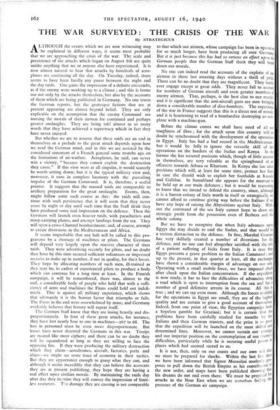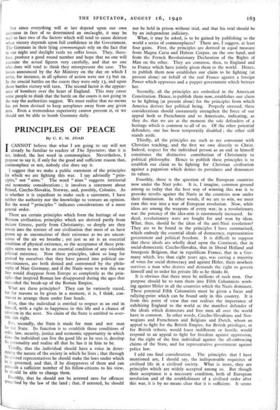THE WAR SURVEYED : THE CRISIS OF THE WAR
By STRATEGICUS
ALTHOUGH the events which we are now witnessing may be explained in different ways, it seems most probable that we are approaching the crisis of the war. The scale and persistence of trie attacks which began on August 8th are quite unlike anything that we or anyone else have experienced. It is now almost natural to hear that attacks by hundreds of aero- planes are continuing all the day. On Tuesday, indeed, there seems to have been hardly any pause between the night and the day raids. One gains the impression of a definite crescendo, as if the enemy were working up to a climax ; and this is borne out not only by the attacks themselves, but also by the accounts of them which are being published in Germany. No one trusts the German reports, but the grotesque fictions that are at present appearing are almost beyond belief. They are only explicable on the assumption that the enemy Command are nursing the morale of their airmen for continued and perhaps greater onslaughts. They are being told almost in so many words that they have achieved a supremacy which in fact they have never enjoyed.
But whether we are to assume that these raids are an end in themselves or a prelude to the great attack depends upon how we read the German mind, and in this we are assisted by the considered statement of a French general some months ago on the limitations of air-warfare. Aeroplanes, he said, can never win a victory, " because they cannot exploit the destruction they cause." If this view were at all singular, it would scarcely be worth setting down; but it is the typical military view and, moreover, it runs in complete harmony with the prevailing impulse of the German Command. It is, therefore, a useful pointer. It suggests that the massed raids are comparable to artillery preparation for the great onslaught. Events, then, might follow some such course as this : the raids will con- tinue with such persistence that it will seem that they never cease by night or day until such time that the Staff think they have produced some real impression on the defence. Then the Germans will launch even heavier raids, with parachutists and troop-carrying planes, and attempt landings from the sea. They will open a cross-Channel bombardment; and, of course, attempt to create diversions in the Mediterranean and Africa.
It seems improbable that any halt will be called to this pro- gramme by a shortage of machines or pilots. The Germans will depend very largely upon the massive character of their raids. They were advertising recently for pilots, and no doubt they have by this time secured sufficient volunteers or impressed recruits to make up in number, if not in quality, for their losses. They hope by allocating numbers of such men, ill-trained as they may be, to cadres of experienced pilots to produce a body which can continue for a long time at least. In the Finnish campaign, it will be remembered, there was, almost to the end, a considerable body of people who held that with a suffi- ciency of arms and machines the Finns could hold out indefi- nitely. This is against all military experience, which shows that ultimately it is the human factor that triumphs or fails. The Finns in the end were overwhelmed by mass; and Germany evidently believes that history will repeat itself.
The German Staff know that they are losing heavily and dis- proportionately. In four of these great attacks, for instance, they have lost nearly four to one in machines-267 to 68. The loss in personnel must be even more disproportionate. But losses have never deterred the Germans in this war. Trodps are treated like mere ciphers; and there can be no doubt they will be squandered as long as they are willing to face the opposing fire. If they were producing the military destruction which they claim—aerodromes, aircraft, factories, ports and ships—we might sec some trace of economy in their tactics. But they are opportunist enough to grasp what they can, and although it seems incredible that they can believe the accounts they are at present publishing, they hope they are having a real effect upon civilian morale. By maintaining the raids day after day they imagine they will convey the impression of limit- less resources. TIT damage they are causing is not comparable to that which our airmen, whose campaign has been in operat:on for so much longer, have been producing all over Germany, But it is just because this has had so serious an effect upon the German people that the German Staff think they will break down our morale.
No one can indeed read the accounts of the exploits of ot airmen in these last amazing days without a thrill of pride. There can be no doubt that they are magnificent. They hardly ever engage except at great odds. They never fail to account for numbers of German aircraft and even greater numbers of enemy airmen. That, perhaps, is the best clue to our morale; and it is significant that the anti-aircraft guns are now bringing down a considerable number of dive-bombers. The experience of the war in France suggests that this is a direct test of morale, and it is heartening to read of a bombardier destroying an aero- plane with a machine-gun.
Before the climax comes we shall have need of all our toughness of fibre ; for the attack upon this country will no doubt be synchronised with the development of the operations in Egypt. Italy has had a bad record in the Mediterranean; but it would be folly to ignore the versatile skill of her operations on the borders of the Sudan and Kenya. In the former she has secured positions which, though of little account in themselves, are very valuable as the springboard of an offensive towards Atbara or Khartum. In Kenya she has taken positions which will, at least for some time, protect her flank in case she should wish to exploit her footholds at Kassala and Gallibat. In Somaliland she appears for the moment to be held up at our main defences ; but it would be reassuring to know that we intend to defend the country, since, although it is a barren colony of little worth in itself or strategically, we cannot afford to continue giving way before the Italians if we have any hope of raising the Abyssinians against Italy. With- out the command of the sea Italy cannot hope to draw strategic profit from the possession even of Berbera and the whole colony.
But we have to recognise that when Italy advances upon Egypt she may decide to raid the Sudan, and that would be a serious distraction to the defence. In fine, Marshal Graziant has very skilfully created a number of diversions for the defence, and no one can feel altogether satisfied with the role of a patient suffering of kicks from Italy. It is true that Egypt presents a grave problem to the Italian Command ; and up to the present, in that quarter at least, all the exchanges have shown a considerable margin of advantage on our side. Operating with a small mobile force, we have imposed check after check upon the Italian concentration. If the expedition is now ready, it has to face the difficulties of advancing along a road which is open to interruption from the sea and has a number -of good defensive arrests in its course. All this is true ; and we can say even more. Although the forces available for the operations in Egypt are small, they are of the highest quality and are certain to give a good account of themselves- Indeed, from one point of view, the Egyptian campaign looks a hopeless gamble for Graziani; but it is certain that the problems have been carefully studied for months by the Italians and their German masters, and the prize is so great that the expedition will be launched on the most skilful and determined lines. Moreover, we cannot sustain our prange and our imperial position on the contemplation of our enernys difficulties, particularly while he is securing useful Pawns 113 places which had seemed sacred to us.
It is not, then, only on our coasts and our own soil that we must be prepared for shocks. Within the last few (LW we have been informed that Signor Mussolini modestly 131°- poses to pull down the British Empire as his contribution to the new order, and maps have been published showing that his dreams do not end even there. We must be prepared fa attacks in the Near East when we are ourselves feeling the pressure of the German air campaign. • But since everything will at last depend upon our own calmness in face of so determined an onslaught, it may be well to face two of the factors which will tend to cause distrust when victory depends upon full confidence in the Government. The Germans in their lying communiqués rely on the fact that in our night and daylight raids we suffer losses. They, there- fore, produce a good round number and hope that no one will examine the actual figures very carefully, and that no one who does will tend to think they misrepresent the case. The losses announced by the Air Ministry on the day on which I write, for instance, in all spheres of action were not 13 but 29. In the crucial battles on the coasts they were only 13, and upon those battles victory will turn. The second factor is the appear- ance of bombers over the heart of England. This may cause some people to think that the battle on the coasts is not going in the way the authorities suggest. We must realise that no means has yet been devised to keep aeroplanes away from any given area. Even a tremendous superiority cannot prevent it, or we should not be able to bomb Germany daily.



























 Previous page
Previous page